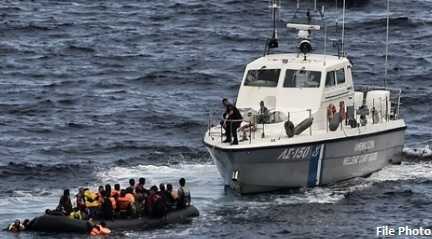
08 June 2023; MEMO: Italy sought last-minute changes on Thursday to a tentative EU agreement on sharing out responsibility for looking after migrants and refugees, pushing for a cut in the number of people each country would take on Reuters reports.
Home affairs ministers from across the 27-member bloc are meeting to try seal a deal to end years of damaging feuds dating back to 2015, when more than a million people – mostly fleeing the war in Syria – reached the EU across the Mediterranean.
Representatives from Germany, Spain and France had raised hopes of a final agreement later on Thursday.
But Matteo Piantedosi, the Interior Minister from Italy's right-wing government, said there was still work to do. "We cannot adopt a reform that is destined to fail," he told his fellow ministers.
He asked for more cooperation with states outside the EU to reduce irregular immigration, more detail on how much compensation would come to countries like his from EU states which refuse to host migrants, and other changes.
Migration has become an increasingly divisive issue in the bloc over the past decade.
READ: Frontex, Italy aware boat was in distress hours before 94 died: report finds
Countries on the bloc's southern edge, including Italy and Greece, have demanded more help to cope with the number of people arriving on their shores.
Richer countries, including Germany and Sweden, have sometimes balked at the numbers heading on to their territories.
Eastern EU countries, such as Poland and Hungary, have refused to host anyone from the mainly-Muslim Middle East and North Africa, while right-wing and populist parties across the bloc have fuelled the debate with anti-immigration rhetoric.
Under the deal, each country would be responsible for a particular number of people, but would not necessarily have to take them in.
Countries unwilling to receive irregular migrants and refugees arriving ad hoc to the EU would be able to help their hosting peers through cash, equipment or personnel.
The agreement would introduce an expedited border procedure for those deemed unlikely to win asylum to prevent them from lingering inside the bloc for years.
As Piantedosi spoke, Italian Prime Minister, Giorgia Meloni, her Dutch colleague, Mark Rutte, and the head of the EU's Executive announced a visit to Tunisia to discuss economic and energy ties with the country, a gateway for African migration to Europe.
Speaking at a news conference in Rome, Meloni said she was convinced there will be a deal among EU countries. Her guest, German Chancellor, Olaf Scholz, said he hoped for an agreement on Thursday or "soon afterwards".
An EU diplomat and an EU official, who both spoke on condition of anonymity, said work on incorporating Rome's demands was going on behind closed doors and an agreement was close.
A second EU diplomat said he had no high hopes for a breakthrough.
"You can still win and lose any election in any member state on migration. It is an illustration of how contentious this issue is," a third EU diplomat involved in the negotiations said.




